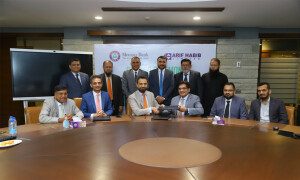But for the looming threat posed by so-called Islamic State of Iraq and Syria (ISIS) the most intractable rivals in the Middle East, Saudi Arabia and Iran, may have persevered in their positions of antagonistic policies and hostile posturing on myriad regional issues, even a year after President Rouhani's ice-breaking first comment after election to improve ties with the Arab Gulf countries. They oppose in Iraq, Syria, Yemen and Bahrain and try sorting out each other through their proxies in a number of other places, never hesitating to exploit the lingering Shia-Sunni sectarian divide. But no more, given the rise of Islamic State of Iraq and Syria, a geopolitical upheaval critical to the future of the region as was the demise of the Ottoman Empire or the birth of Israel. Within weeks of its emergence the Islamic State has captured large swathes of territory in Iraq and Syria, at one point well in sight from the Iranian border; and it doesn't seem to be stopping at that. That is in terms of its territorial sweep; in terms of religious affiliation, however, it has declared Shia Muslims heretics and took their lives at show trials in Mosul. It is a no mean threat to moderate Sunnis, be they in Saudi Arabia or anywhere else. No wonder the commonality of threat took no time to ring alarm bells both in Tehran and Riyadh. The leaderships in those capitals rightly realised that Nour al-Maliki was an obstacle towards forging a unified Iraqi stand against Islamic State, and endorsed Haider al-Abadi's candidature for the job in Iraq. On its part, Tehran sent a new ambassador to Saudi Arabia, as foreign ministers of Saudi Arabia, Egypt, Jordan, the UAE and Qatar met to firm up a joint stand to confront and neutralise the threat of the Islamic State. The Iranian Deputy Foreign Minister Hossein Amir Abdollahian's meeting with Saudi Foreign Minister Saud al-Faisal this past Tuesday is indeed a measure of the quality and size of the threat the Islamic State poses to regional stability. What Saudi counterpart Abdollahian said was 'positive and constructive' and in that meeting both sides sought to contain the militants and discourage others from joining the ranks of the Islamic State forces.
How that would happen it is going to take time, but definitely it is the need of the hour for the Middle East in particular, where a number of conflicts are exclusively sectarianism-based and the Muslim states and societies world over in general. Of immense satisfaction to us in Pakistan would be the growing Saudi Arabia-Iran rapprochement for not only would it free us from the dilemma of choosing one at the cost of the other at the government-level, it would also help us check an uncountable growth of rabid sectarianism. Take the case of Iran-Pakistan gas pipeline; the Iranian gas is yet to reach Pakistan to alleviate the plight of our energy-starved people only because the option had the in-built verdict of being caught between a rock and a hard place. Take the curse of sectarian strife, which is a prime threat to our sectarian harmony. We know who is using the fanatic fringes but we cannot openly identify him. With Tehran and Riyadh operating on the same wavelength in their worldviews in foreign policies will not only help stabilise a region crumbling under forces of extremism, the Muslim populations in other countries particularly as minorities, will find less problems to recover their peaceful credentials. Given the historic significance of the Iranian minister's meeting with Saud al-Faisal it is every peace-loving Muslim's wish that it should be followed up by more such contacts to help arrive at the much-needed consensus that nothing is more destructive to the unity of Muslim world than the spectre of extremism that raised its ugly head from within.
BR100
12,200
Increased By
473.7 (4.04%)
BR30
38,071
Increased By
1694.4 (4.66%)
KSE100
113,646
Increased By
4133.2 (3.77%)
KSE30
35,948
Increased By
1434.8 (4.16%)

























Comments
Comments are closed.